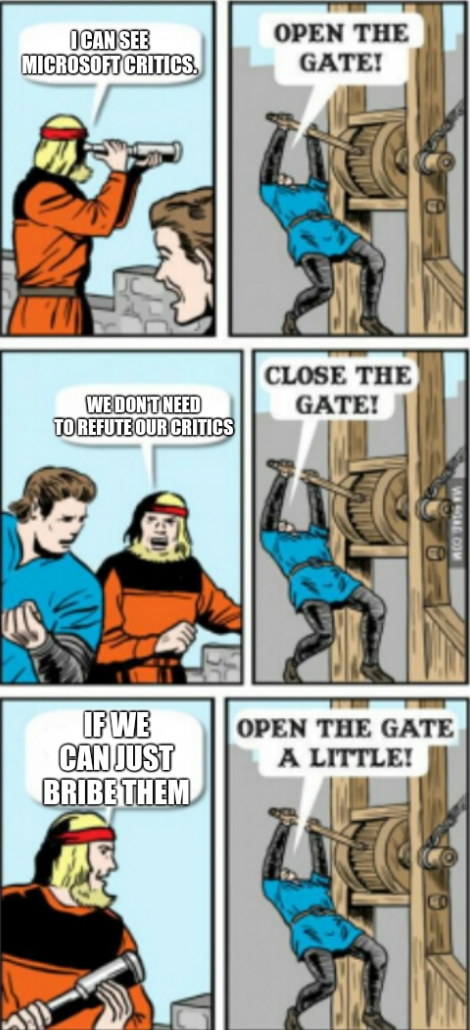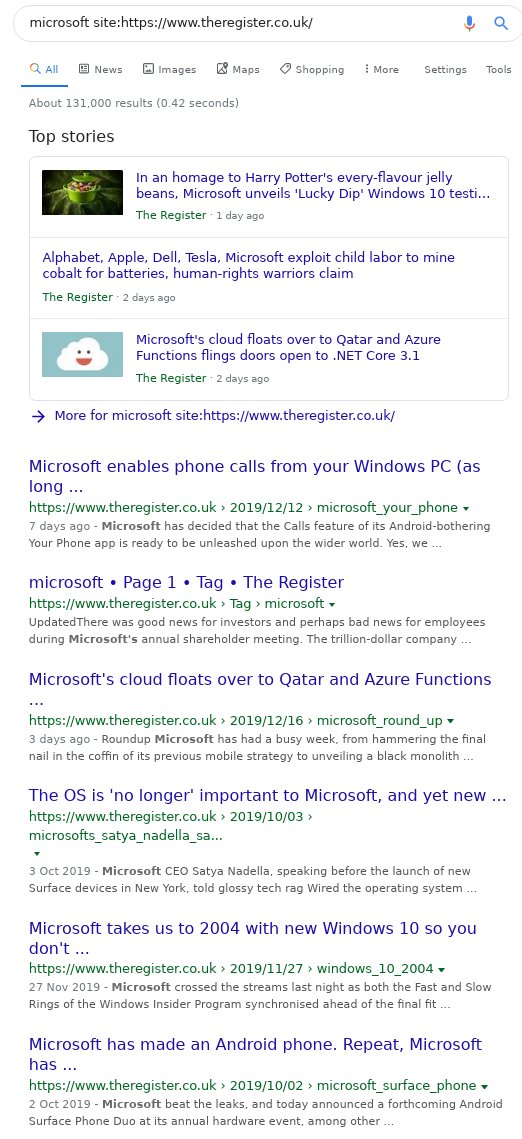

THE VARIOUS "Linux" podcasts have more lately spoken quite a bit about "WSL"; it seems like a coordinated charm offensive, facilitatef partly by Microsoft and partly by Canonical. Similarly, in recent days we saw Red Hat pushing .NET quite a few times and some Python podcasts had Microsoft as guests. It's very clear Microsoft tries to dominate the discussion in order to push Windows, Visual Studio, GitHub, Azure and so on.
"It's very clear Microsoft tries to dominate the discussion in order to push Windows, Visual Studio, GitHub, Azure and so on.""The Register on "Microsoft Linux"," one reader wrote to us last night, is a trend worth taking stock of. "We would be familiar with the typical Microsoft strategy," he explained. "In this case, "partner" with a Linux company, generate some mindshare goodwill, then make sure the Linux subsystem isn't any use and will only run on Windows."
He cited yesterday's article about "multipass" -- a project Canonical released on... Microsoft GitHub. And guess whose agenda the article promotes....
As our reader put it (somewhat rudely): "What the fuck was Canonical thinking in 'partnering' with the borg?"
"No, we haven't missed the irony of Microsoft lovers with virtually no history in GNU/Linux development taking the 'lead' on this."He also took note of Canonical's decision to give Microsoft money for WSL's propaganda outlet. We alluded to this before.
"This is what Lenin refereed to supporters of Soviet-ism in the west "useful idiots"," our reader asserted, pointing to some of the culprits (we'll try to keep this impersonal and therefore redact some bits).
No, we haven't missed the irony of Microsoft lovers with virtually no history in GNU/Linux development taking the 'lead' on this. Nor have we overlooked their disdain for GNU/Linux and tacit support for Microsoft's patent blackmail against GNU/Linux. This is what WSL is. These are the people who take the lead! The managers...
Back to our reader: "Censorship at The Register" has meanwhile been claimed as well. They apparently censor a lot of comments that don't suit the narrative Microsoft wants. "Do an article on what advertising revenue (bribery) The Register gets from Microsoft, same with ZDNet and the rest," the reader said.
"They apparently censor a lot of comments that don't suit the narrative Microsoft wants."We actually wrote a lot about that in the past. Heck, we have a whole wiki page with articles about ZDNet -- a site I repeatedly encourage people to boycott (nowadays it's managed by a Microsoft fan, not even a closeted one, who writes clickbait as headlines and we know for whose agenda).
Our reader is certainty aware. It's difficult not to notice.
"I have a new slogan for The Register," he said. "The Register, whatever you do, don't mention 'MICROSOFT'. I'm afraid the Reg has gone bad for a long time. The only time you read about Linux is in relation to the MICROSOFT Linux sub-system, or Linux in relation to malware, but when it's on Windows then it's referred to as "banking" malware, else they keep pushing 'cloud' solutions."
A lot of their "Linux" or "FOSS" coverage (more so nowadays) comes from Microsoft Tim, just like Microsoft Peter (the pedophile) at Ars Technica up until his arrest. Their whole "Open Source" section was nothing except Microsoft lies and marketing. Literally all of it was just that when he was arrested. Need we mention that Ars Technica UK was -- by admission/confession made to me by its editor -- funded by Microsoft? Guess what dominated that site until it perished...
But let's go back to The Register. Microsoft Tim's case merits a post of his own. It's like Microsoft took journalistic authority over "Linux" and "FOSS". It calls the shots and sets the tone/narrative at The Register. Another person who once had this role, Ashley Vance, is nowadays doing propaganda pieces for Microsoft at even larger publishers (like some mythical Arctic vault -- basically fake news that helped distract from ICE controversies).
The reader suggested doing this search or that search. Find a negative article below...


"I've also noticed it's hard to find announcements of Bill Gates bribes (payments for particular publishes) -- which they openly disclose initially -- because they're once paid they're googlebombing the relevant search phrases with puff pieces (paid-for lies)."We would need to unearth that old article about the El Reg-Microsoft partnership. "Probably found in the 2003 or 2004 series," an associate of ours recalls, "but just as an announcement... not necessarily a main article."
These things are hard to find after all these years. I've also noticed it's hard to find announcements of Bill Gates bribes (payments for particular publishes) -- which they openly disclose initially -- because they're once paid they're googlebombing the relevant search phrases with puff pieces (paid-for lies). It's a real problem and it goes beyond advertising money. In the past we also showed examples of Bill Gates paying publishers critical of him and of Microsoft; soon afterwards they deleted all those past articles. It seemed rather clear what they were paid for. ⬆